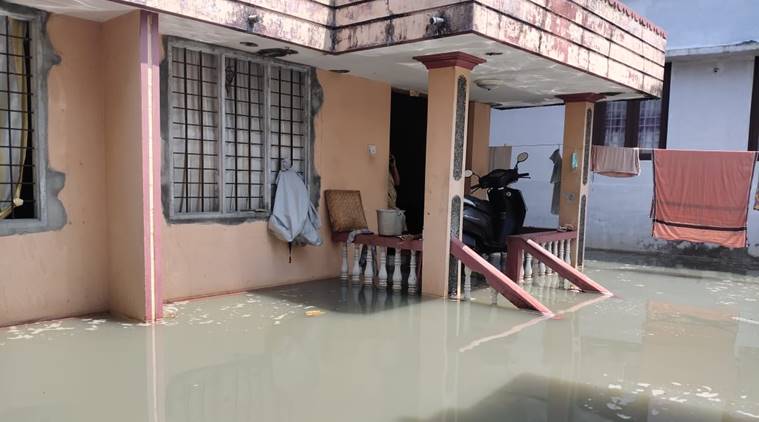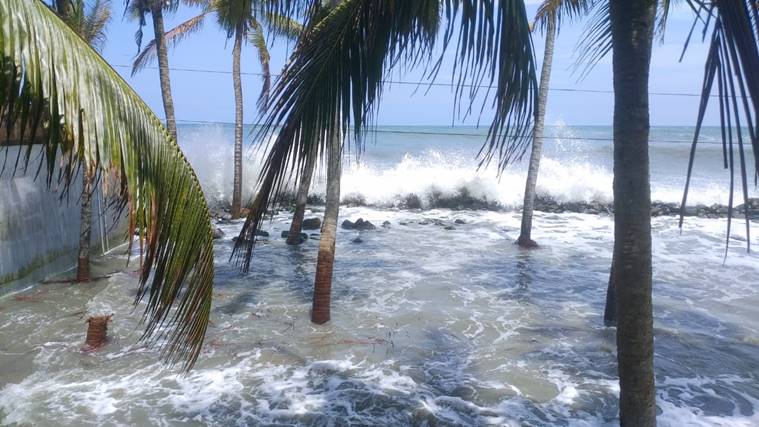 One of the flooded homes in Chellanam
One of the flooded homes in Chellanam
For many in Chellanam, a tiny coastal village wedged between the sea and the backwaters 20 kilometres off Kochi, the erosion of the sea is a routine affair they have learnt to grapple with. When the sea gushes into their bedrooms and kitchens, they run off to nearby homes of relatives or seek shelter at the local government school. But this year, they can’t afford to take such risks.
For the past two weeks, Chellanam has been under a tight lockdown after nearly 200 people in the village got infected with Covid-19, starting from an elderly fishworker at the local harbour. It has been described by health officials as one of the ten big clusters in the state.
So through Sunday and Monday, when the waves broke into several households on the coast dismantling one completely and partially eroding others, the people didn’t know what to do. Many of them, under quarantine, remained inside as their homes got flooded gradually.
 In Chellanam, the problem of flooding is not new.
In Chellanam, the problem of flooding is not new.
“There are houses falling in many places, I don’t have an exact count. Things are really, really bad. Many people, whose homes are flooded, are sitting up on their beds, I heard,” said Mercy Josy, president of the local panchayat, her voice shrouded in anguish.
Antony Jackson, an Uber driver from the village who has been out of work for the past five months, said the sea-water had reached the main road, around 600 metres from the coast, by Monday afternoon, indicating the intensity of the erosion. A health clinic and a school are among several buildings that have sunk. His home has not been breached by floodwaters yet, but it’s not a probability he can count on.
“My neighbourhood usually gets flooded every year. But this time, it has reduced a bit thanks to a few geotube bags that were installed by authorities. Once those bags split open, the water will make its way to my house too. It won’t take much time,” said Jackson.
“I live with my mother and aunt. Both their hands are broken. If the water seeps in, I don’t know where I will go.”
Though a majority of those detected with the virus hail from three of the 21 wards in the panchayat, there’s a sweeping feeling among the population that the virus could be present anywhere. That automatically makes them reluctant to invite their close ones into their homes or even help out a person in need. If in previous years, flooding brought communities closer, this time, people are cautious and often helpless.
“Everyone is scared. They are not stepping out of their homes. We may be in a frame of mind to help out a person whose home gets flooded, but how do we do it? What if our families get affected too?” asked Jackson. “It’s a terrible time.”
In Chellanam, the problem of flooding is not new. For years, the residents have been staging protests and hunger-strikes, demanding a sturdy sea-wall constructed using boulders to protect their homes from erosion. Over the years, while the sea-wall has come up in the northern stretches of the panchayat, it’s totally absent in the southern reaches, exposing dozens of homes to the vagaries of the sea. When protests get loud each year, the authorities respond by temporarily depositing a few geo-tubes filled with sand on the coast. But for the monster waves that lash at high tide, such geo-tubes are no match.
Hibi Eden, the local MP of the Congress, placed the blame at the door of the state government and the district administration for dragging its feet on the sea-wall project. “When the government brought in the geotube project on an experimental basis, we didn’t oppose it. But the contractor who took the job was a huge failure. Another contractor came who gave many ideas, but his dredger sank in the sea. For the people there, these are not excuses. We have always asked for a sea-wall built with boulders and breakwater. That’s the long-term solution,” he said.
Now that the flooding has come at a time when the village is facing a surge in Covid-19 cases, the MP said he’s pondering about requesting for central forces who can be deployed on the ground as part of disaster management.
A top official of the district administration said a temporary relief camp, complying with Covid-19 protocol, has been set up at a three-storey school for those whose homes are flooded.